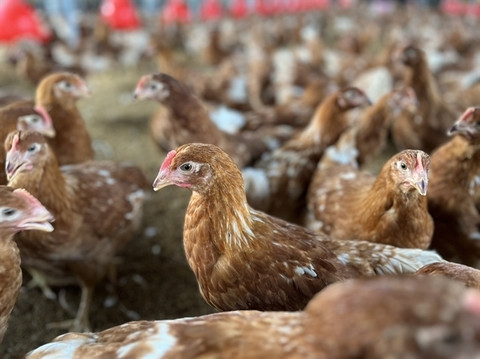
A chicken farm of Green Connect company in Dong Nai Province. Many companies in Viet Nam now use free-cage eggs in their production. — Photo Courtesy Green Connect
Accordingly, over 40 multinational and domestic companies who operate in the fields of hotel, restaurant, retail, manufacturing have decided to use cage-free eggs in their production.
“Major brands like Mondelez International, Fusion Hotel Group and Pizza4P’s are all committed to sourcing only cage-free eggs in Viet Nam no later than 2025,” said Hang Le, regional farm animal welfare manager for Humane Society International (HIS) in Southeast Asia.
Companies attribute multiple benefits to choosing the cage-free egg. Specifically, cage-free production improves animal welfare conditions by allowing laying hens to move around freely in their environment and engage in natural behaviours, and this approach is supported by human organisations as well as consumers.
By the end of last year, Mondelez Kinh Do Vietnam had become a pioneer in using cage-free eggs to produce cake when launching the Solite Nature Fresh cake, which uses 100 per cent cage-free eggs.
The company’s third Annual State of Snacking Report found that consumers were growing more intentional about their purchase decisions as they became more in touch with their values.
The report found that customers were making more efforts to learn more about the brands and companies they buy from and becoming more discerning over the sustainable nature of their chosen snacks. Eighty-five per cent of consumers worldwide wanted to buy snacks from companies offsetting their environmental footprint.
"Free-cage eggs are an indispensable trend chosen by customers. Products made from eggs laid by hens which are raised in small cages will not attract consumers," Hang said.
Currently, there are more and more producers in Viet Nam that provide free-cage eggs to companies such as Nam Huong, Vinh Thanh Dat and Green Connect.
Of them, Green Connect, a social enterprise, has already taken steps toward its commitment by collaborating with its in-house farm production brand Larva Yum. In response to consumer demand for animal welfare and environmental sustainability, Larva Yum introduced its free-range egg product.
As of April 2023, Larva Yum had raised 6,500 hens in both free-range and cage-free barns, allowing the hens to freely engage in their natural behaviours such as perching and dustbathing.
“Working on animal welfare and the circular economy is a key vision of our business, as at Green Connect our team has a passion for creating something that is not only good for consumers but also respects our planet and other species,” said Huynh Hanh Phuc, CEO and founder of Green Connect.
In addition to moving hens out of cages, Humane Society International is working with pork producer Nguyen Khoi and eight food retailers to eliminate the production or procurement of pork from systems that confine mother pigs to crates so they are unable to turn-around for the majority of their lives.
A crate-free production system provides mother pigs with more space to move and turn around compared to the intensive and long-term confinement of gestation and farrowing crate systems. These examples show how companies are responding to Vietnamese consumer demand to end some of the most inhumane practices inflicted on animals.
In 2021, Viet Nam had nearly 77 million hens who laid 8.2 billion eggs, according to the Food and Agriculture Organisation of the United Nations. There are thousands of egg producers in the country, with varying sizes of production. — VNS